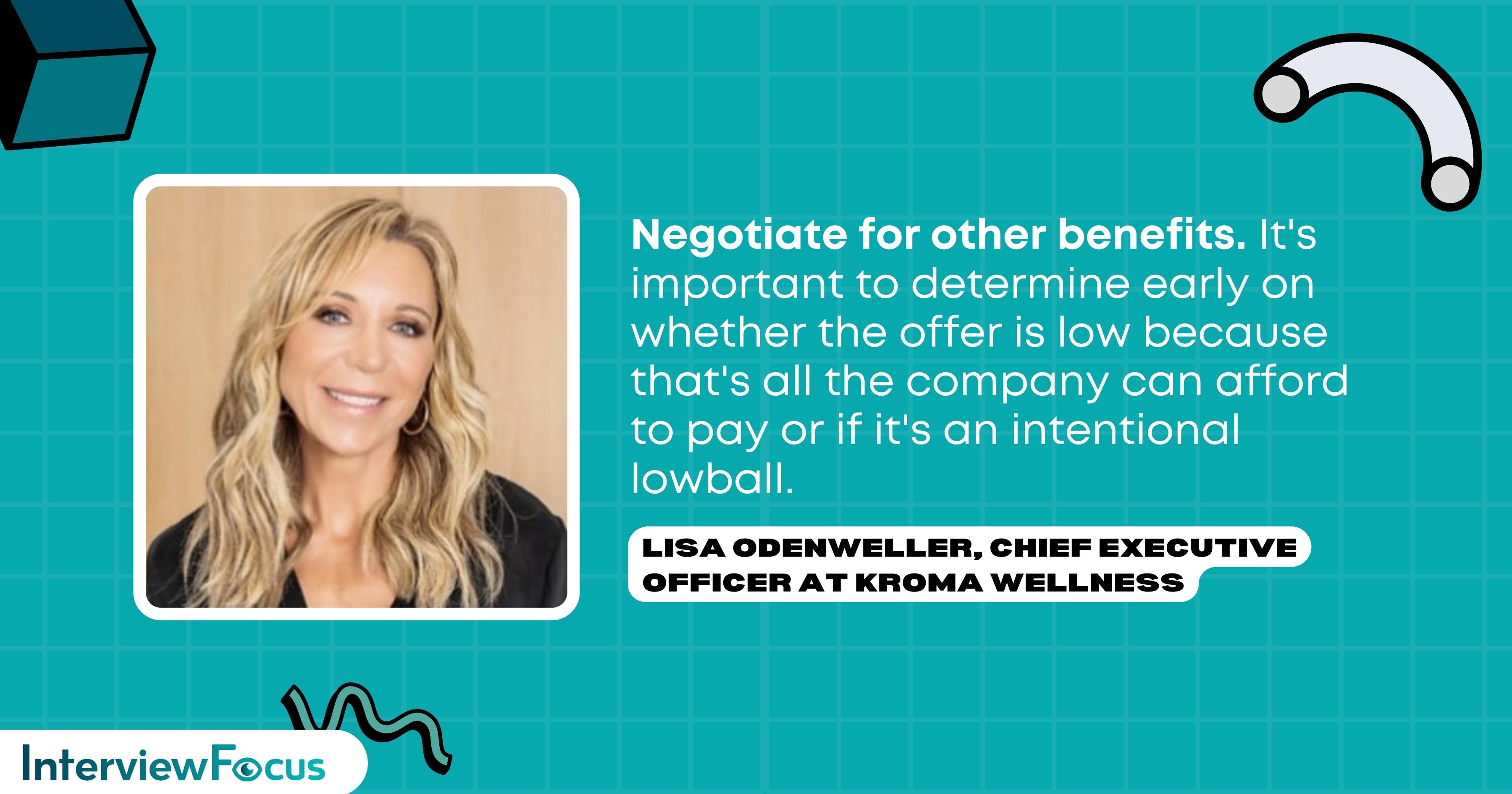How should you respond to a lowball job offer?
To help you best respond to a lowball job offer, we asked hiring managers and experienced recruiters this question for their best advice. From responding with the right questions to negotiating for a performance review, there are several tips that would help you choose your response appropriately to make the best out of the situation.
Here are 11 tips these leaders would follow in responding to a low job offer:
- Respond With the Right Questions
- Negotiate for Other Benefits
- Be Gracious and Probe if Anything Could Improve or Not
- Don’t Take It Personally
- Be Collaborative and Not Confrontational
- Find Out When Salary Could Increase
- Thank Them and Ask for Time to Consider it
- Ask if the Offer is Negotiable
- Consider Long-Term and Work Backward
- Tip for a Low-ball Job Offer
- Negotiate for a Performance Review
Respond With the Right Questions
A lowball job offer doesn’t necessarily have to be the end of the road. Instead, treat it like the start of the negotiation phase and line up questions that could work in your favor. Begin with questions on if you were specifically being offered a lower than usual package or if this was more in line with the company’s remuneration policy. Find out if you fall short in any way and if responding with the requisite information would make a difference. You can even ask for details on associated perks and benefits that may justify a lower core salary. Depending on the answers you receive, you can make an informed decision or learn some essential insights for a more convincing round of negotiations.
Riley Beam, Douglas R. Beam, P.A.
Negotiate for Other Benefits
Negotiate for other benefits. It’s important to determine early on whether the offer is low because that’s all the company can afford to pay or if it’s an intentional lowball. If it’s the latter, it’s worth taking some time to think about if you want to join a company that doesn’t want to invest in you. But if it’s the former, and especially if it’s a job you really want, you should try to negotiate additional benefits in lieu of pay. Extra vacation time, flexible hours or work-from-home options are all cost-effective for the business and can make up some of the gap in cash compensation.
Lisa Odenweller, Kroma Wellness

Be Gracious and Probe if Anything Could Improve or Not
You catch more flies with honey than vinegar. When presented with a lowball offer, being gracious is your best bet to getting what you want. For example, politely explain that while you are interested in the position and feel passionate about the company, their offer isn’t plausible for your lifestyle and/or living expenses. Thank them for the opportunity and either ask if there is room for negotiation or come right out with a counter-offer. This will show that you know your worth and if they do have the capacity for upping the offer, they will.
Matt Woods, SOLD.com
Don’t Take It Personally
My biggest tip for any candidate that has received a lowball offer is to not take it personally. There can be many reasons why the employer offered the salary they did. Part of the reason could be their budget, or maybe they are expecting you to negotiate with them. However, when you get a lowball offer it never has to do with you personally. However, if you’re not happy with the offer, and you’re not willing to negotiate, just stay calm, and thank them for their time. Never accept anything less than you’re worth.
Rich Rudzinski, Tragic Media
Be Collaborative and Not Confrontational
Believe it or not, companies want talent at the best possible price. One thing that should remain consistent across the entire hiring process is that you should remain pleasant. HR and employers want to pay candidates they like and would enjoy working with. If you are confrontational or rude they will wonder what it would be like to work with someone who is combative. When you receive a lowball offer, negotiate, collaboratively. Consider these factors when preparing your counter-offer: Your Qualifications, Skill Level, Work Ethic, offers from other companies, and the Market Average.
Then, approach with collaboration. For example, “I’m very happy to have received an offer! This opportunity sounds like a great fit and based on our conversations I know I would be an excellent addition to the team. But, based on my experience I’m targeting a base pay of X, how close can we get to that?” If they refuse to change the salary, politely remove yourself from contention, and move on!
Dan Reed, Top Prospect Careers

Find Out When Salary Could Increase
Ask if there is much room for growth and advancement at the company. Perhaps they are offering a lower salary to be safe and not make too big of an investment before getting to know you better. However, if you can prove how skilled and efficient you are, they may increase your salary in the coming months. Find out if this is possible. In that case, you could make the decision to give this job a chance.
Drew Sherman, Carvaygo
Thank Them and Ask for Time to Consider it
Don’t respond emotionally or take it personally. Instead, thank them for the offer and ask for time to consider it. They may respond with a better offer. If not, this gives you time to consider what might be acceptable to you in regards to negotiation, perhaps better benefits to compensate for the low salary? Just know that there are a myriad of reasons why you may receive a lowball offer, having nothing to do with your worth and this may only be the beginning of the conversation.
Erin Banta, Pepper
Ask if the Offer is Negotiable
If an offer is made that you believe should be higher or offer a better total compensation package, ask the employer these four magic words, “Is this offer negotiable?” Oftentimes employers have a salary range, bonuses, and/or benefits that they have available to negotiate. Make sure you have the minimum salary, bonus, and benefits in mind before asking the magic question. Not sure what those numbers are or should be? Do some research before having the discussion. You can find tons of information regarding compensation ranges in your field, industry, level, and location online, such as Glassdoor, Salary.com, Indeed, and Payscale.
Lucie Yeomans, Your Career Ally
Consider Long-Term and Work Backward
Consider the long-term. What a great position to be in, but it does require some deep thinking. When you’re choosing between two job offers, think about where you want to be in your career in 7 years and which of these two jobs will get you there (or get you closest). Think about each job and be as honest as you can with yourself. What are the perks? What are the downfalls? What aspects you’re surprised you like? Who are the team members you connect with the most? Write it all down and then assess. The best way to make the right choice here is to set your end goal and work backward.
Karim Hachem, Sunshine79
Remain Polite While You Make a Decision
Suppose you are in an interview, and you get a meager offer. The first thing you should do is say thank you because you want to remain polite, but then follow up with either that you’ll go away and think about it, or you can then explain you know your worth and that the offer given does not match the expertise you can provide and proceed to try and negotiate a better deal.
Or another quick tip would be not to be afraid to walk away from a lousy offer; you are not being unfair or unappreciative, and finding a career that will pay you what you are worth is more important than anything else.
Wendy Makinson, Joloda Hydraroll
Negotiate for a Performance Review
When one gets into a new job, the employers may be skeptical about their skills – hence the tendency to give low salaries. The employee in question may negotiate for a performance review after a set period of time, so that the company can eventually place them in a better position to get the salary they deserve after their competency has been tested. The review may come in the form of a promotion or some incentives, bonuses, or salary increment.
Yongming Song, Imgkits





